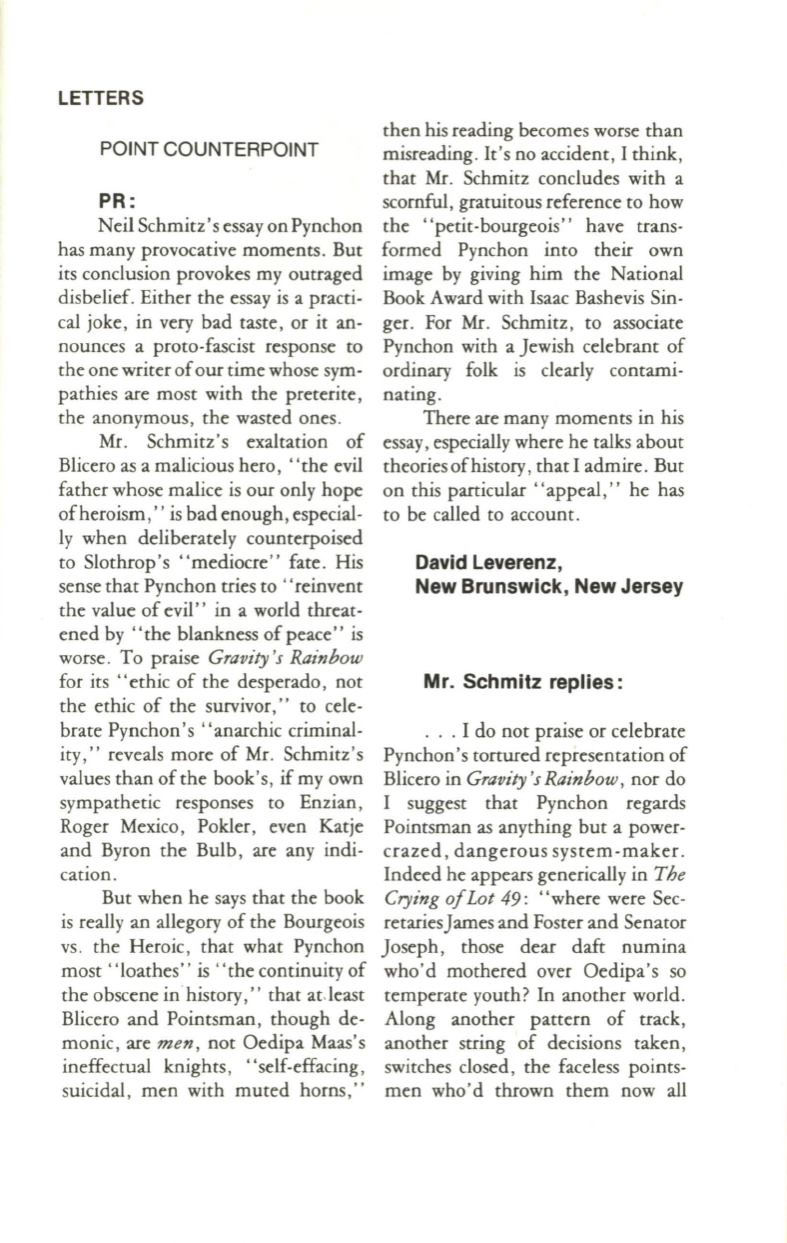
LETTERS
POINT COUNTERPOINT
PR:
Neil Schmitz's essay on Pynchon
has many provocative moments. But
its conclusion provokes my outraged
disbelief. Either the essay is a practi–
cal joke , in very bad taste, or it an–
nounces a proto-fascist response to
the one writer ofour time whose sym–
pathies are most with the preterite,
the anonymous , the wasted ones.
Mr. Schmitz's exaltation of
Blicero as a malicious hero, " the evil
father whose malice is our only hope
of heroism ," is bad enough, especial–
ly when deliberately counterpoised
to Slothrop's "mediocre" fate. His
sense that Pynchon tries to "reinvent
the value of evil " in a world threat–
ened by "the blankness of peace" is
worse . To praise
Gravity 's Rainbow
for its " ethic of the desperado, not
the ethic of the survivor," to cele–
brate Pynchon 's "anarchic criminal–
ity, " reveals more of Mr. Schmitz 's
values than of the book's, if my own
sympathetic responses to Enzian ,
Roger Mexico , Pokier, even Katje
and Byron the Bulb , are any indi–
cation .
But when he says that the book
is really an allegory of the Bourgeois
vs. the Heroic , that what Pynchon
most " loathes" is " the continuity of
the
0
bscene in history ," that at.least
Blicero and Pointsman, though de–
monic , are
men ,
not Oedipa Maas's
ineffectual knights, "self-effacing ,
suicidal , men with muted horns ,"
then his reading becomes worse than
misreading. It's no accident, I think ,
that
Mr.
Schmitz concludes with a
scornful, gratuitous reference to how
the " petit-bourgeois" have trans–
formed Pynchon into their own
image by giving him the National
Book Award with Isaac Bashevis Sin–
ger. For
Me.
Schmitz, to associate
Pynchon with a Jewish celebrant of
ordinary folk is clearly contami–
nating.
There are many moments in his
essay, especially where he talks about
theories ofhistory , that I admire. But
on this particular " appeal," he has
to
be called to account.
David Leverenz,
New Brunswick, New Jersey
Mr. Schmitz replies:
... I do not praise or celebrate
Pynchon's tortured representation of
Blicero in
Gravity 's Rainbow,
nor do
I suggest that Pynchon regards
Pointsman as anything but a power–
crazed, dangerous system-maker.
Indeed he appears generically in
The
Crying ofLot
49: "where were Sec–
retariesJames and Foster and Senator
Joseph, those dear daft numina
who'd mothered over Oedipa's so
temperate youth? In another world .
Along another pattern of track,
another string of decisions taken ,
switches closed , the faceless points–
men who 'd thrown them now all


